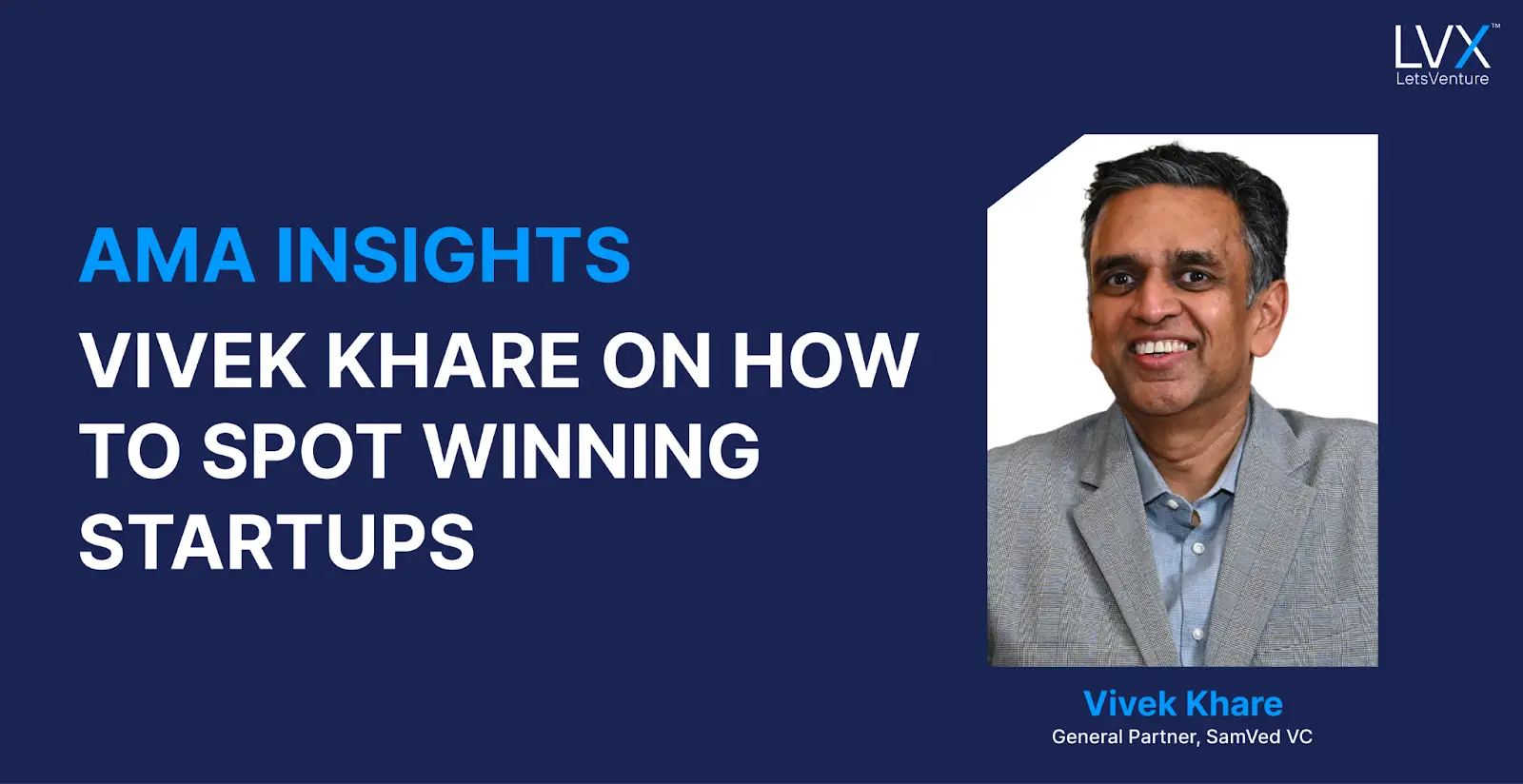
Vivek Khare has been part of India’s startup story since its earliest days. Back in 1999, at the dawn of the internet era in India, he worked at Naukri.com and later went on to back future unicorns like Zomato in their early days. Over the years, his portfolio has included Jaypore, Happily Unmarried, Classify Canvera, Meritnation, Vastra App, and many more.
Today, Vivek is known as a seasoned angel investor with a sharp instinct for spotting opportunities in the zero-to-one stage—helping founders take an idea to market fit.
But while angel investing has been a rewarding journey for him, Vivek never shies away from calling out the risks.
“This is one asset class where your principal can get wiped off. It should never be more than 5 percent of your overall portfolio. But if you’re lucky, that 5 percent can take your wealth to 200–400 percent,” he shared during the LVInsights Ask Me Anything (AMA) session.
Why He Invests: Staying Ahead, Not Just Returns
For Vivek, angel investing is more than just financial gain.
“Money is obviously a big motivator, but that’s a side product. The real reason is to ensure I am not outdated. Working with startups keeps me updated on the latest technologies and connected with some of the smartest people,” he explains.
This perspective has kept him constantly engaged in the ecosystem—and prepared for what’s coming next.
Spotting the Next Big Thing
One of Vivek’s most celebrated bets was on Zomato, back when it was still called Foodiebay. Smartphones weren’t common, but he saw potential in a platform that aggregated restaurant menus—a simple idea positioned to ride the wave of internet and smartphone adoption in India.
“The point is you need to invest before something starts blooming. Once it becomes big, angel money will not be sufficient. Chances are the company looks small or the market seems non-existent, but you have to take that leap of faith that it can grow due to behavior change or technology,” he says.
No Passive Investing: The Karma of Giving First
Vivek firmly believes there’s no such thing as a passive angel investor.
Drawing on Anupam Mittal’s concept of “karma points,” he emphasizes that investors must give a lot to the ecosystem before they can expect returns.
For Vivek, that means rolling up his sleeves:
- Acting as a salesperson to get startups their first clients.
- Playing investment banker to convince co-investors.
- Spending 30% of his time on hiring to help founders bring senior talent onboard.
“Founders are usually young and may not have the gravitas to get senior professionals to join them. That’s where I step in,” he says.
How to Start as an Angel
Vivek advises new angels to begin by joining at least one syndicate group and identifying sectors they feel strongly about.
“If you believe India is going to be a big consumer market, or if you see scope for eco-friendly solutions, build your thesis around that and start small,” he recommends.
Rapid Fire with Vivek Khare
Q: The biggest myth about startup investing?
A: That you can be a passive investor. It just doesn’t work.
Q: One startup you’re most proud of?
A: While Zomato is my claim to fame, I’m proud of being an early investor in Absolute Foods. I spoke to the farmers they worked with, and their conviction sealed my decision.
Q: A deal you regret missing?
A: Too many! But BigBasket and Khatabook stand out.
Q: Your biggest learning as an angel investor?
A: Be humble. You never know who will prove you wrong. No one knows for sure what will work—you work with probability.
Q: Top three sectors you’d invest in today?
- The Bharat Opportunity – Tapping into India’s massive consumer base beyond metros.
- Cleantech – Leveraging technology to solve pollution.
- Collaboration Tools – Products enabling distributed teams to work effectively.
Q: The first question you ask a founder?
A: What led you to this problem? Do you have a deep insight or personal reason? A vague “kuch karna hai” doesn’t work for me.
Q: One reason to invest in the Indian private market?
A: It’s the way to create wealth and improve productivity. I come from a middle-class family, and the reason I could retire early is because a few right investments created value for me. Good businesses run by competent people will always create value.
Key Takeaways for Angel Investors
- Limit your exposure – Keep startup investments to no more than 5% of your portfolio.
- Stay engaged – Passive angel investing doesn’t work; your involvement shapes outcomes.
- Invest early in trends – The biggest wins come before markets bloom.
- Build your thesis – Back sectors where you see long-term potential.
Give first – Build your “karma points” in the ecosystem before expecting returns.




.png)

.png)
.webp)

.png)

.png)

.png)
.png)
.png)